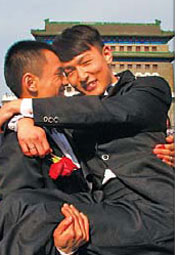Wang Zhiyong was trying to tear up the two copies of a "marriage certificate" embossed with a photo of him and his gay "spouse".
His partner lunged to snatch them back.
However, their token of love finally lay torn and tattered on the ground.
It was only two months earlier that 42-year-old Wang, a senior mechanic based in Beijing, and his much-younger lover got the "marriage certificate" issued by Beijing LGBT (Lesbian, Gay, Bisexual and Transsexual) Center as a tangible expression of their commitment.
Wang threw a small wedding feast to which relatives and close friends were invited.
"I know the wedding was not legally valid, but I liked the freshness of the idea," he said.
Initially, Wang was happy showing certificate No 2 (the second couple to receive the certificate from LGBT Center) around but started feeling anxious about future troubles concerning money and the comparative instability of gay relationships.
"Fearing the possibility that it could be a binding document like an IOU note, I thought it was better not to keep it."
In a nation where same-sex marriages are not legal, Comrades (gays) and Lalas (lesbians) are trying to find colorful formats to fulfill their wedding fantasies, according to people familiar with their communities.
Luke Zhao, coordinator of Beijing LGBT Center and editor of a gay newsletter, said: "We have issued three marriage certificates. In cities like Beijing, Shanghai, Chengdu and Guangzhou, it's getting more and more natural for gays and lesbians to hold similar ceremonies."
Xian (pseudonym), coordinator of lesbian support group Beijing Common Language (Tong Yu), calls those symbolic weddings.
In Shanghai, Xingxing (pseudonym) planned the most expressive way to celebrate his own union with a divorced Comrade.
"He suffered a lot from marriage to a woman. I saved him from darkness."
|

|
|
Zhang Yi (left) and his partner pose fir "wedding" pictures at Qianmen Gate south of Tian'anmen Square on Valentine's Day. [Courtesy of Beijing Tongyu Group] |
Xingxing, a professional wedding planner, understands too well the ritualistic significance of marriage to the Chinese - and when his low-key partner mentioned a wedding, Xingxing was moved and decided to design it as a feast for both the eye and the stomach.
On Lantern Festival - Feb 9 - Shanghai's Shenzhonglou Restaurant witnessed a symbolic wedding featuring a drag fashion show, Chinese opera performances and sumptuous food.
Xingxing was clad in a glamorous cheongsam and used all his talent to entertain the more than 80 guests, including friends, colleagues, former classmates and teachers - but no relatives.
"I'm not a transvestite, I was trying to act professionally since I'm in the entertainment business. Let the whole world know me as I am.
"The wedding tells the public that we are a formal couple. It would have been better if there had a legal procedure to legitimize it. I've tried, failed and suffered like many other gays around me in short-lived affairs.
"Maybe recognized same-sex marriages will provide a turning point for steady relationships between gay lovers."
Describing weddings similar to Xingxing's, Xian said Lalas hold them in lesbian bars following the traditional style with guests and a banquet, and broadcast the ceremonies live online.
"Mostly, what they want is for their near and dear to witness their love and bless them."
There are other choices, too, Xian said. Some travel abroad and marry in regions where same-sex marriage is legal.
"The problem is, if they want to divorce, they need to go back. And I know someone who actually did that," said Xian, pointing out that their weddings would still not be recognized in China.
(China Daily April 16, 2009)